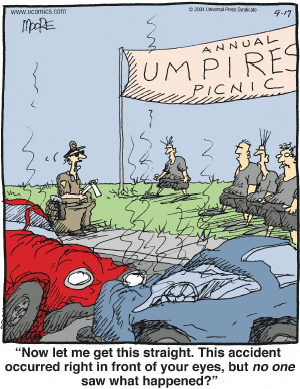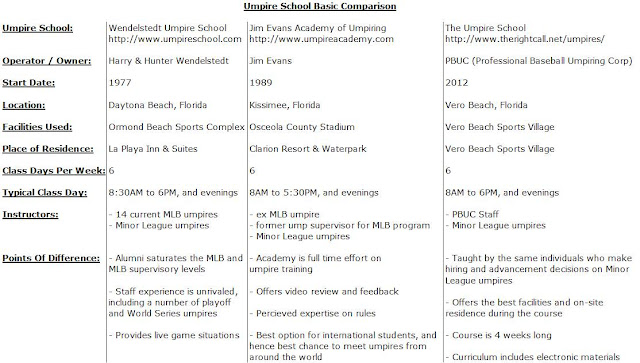Saturday, December 31, 2011
Onwards to Umpire School
"If you never leave home, never let go, you'll never make it to the great unknown"
It was only fitting that on my way to work today, the train conductor punched my ticket, and proceeded to say, "That's your last one." Indeed, not only was it my last ride on the 10 day pass, but it was also my last day at work. Thinking about this, it hit me that I'm really going to do "this." I am going to leave a job working with people that I really liked. Now, leaving a job is always a tricky and difficult decision. There is a high amount of risk and uncertainty involved. Did I make the right choice? Is this new job better for my career? Leaving a job that you enjoyed, working with people that you liked? That's just almost complete stupidity. But, for me, it wasn't that crazy of a decision. In fact, the biggest risk was not making that decision itself. So, in 2 days, I'll be in Florida, going to school, and getting my Ph.D. in umpiring.
My road to umpire school started as a sophomore in college. During that year, I was interning with a minor league baseball team when one of my coworkers introduced me to the idea of umpiring. I had always been interested in what it was like to be a man in blue, and thought that I was smart and capable enough to handle all the split second decisions, while earning a bit of pocket money. Boy was I shocked when I umpired my 1st game, a 11U travel game. I was a fish completely out of water and knowing where to go on the field for the best look at a play and applying all the rules quickly under pressure was a whole new world to me. On top of that, the expectation and challenge to get every call correct, not only by the participants and spectators but by myself as well, was nothing like I had ever experienced. Despite my actual performance in that particular game which I will gladly ignore and erase from my memory because of how terrible I was, the experience was an absolute thrill, and I was hooked.
Since that point, I've never stopped learning about umpiring and have gained a lot from it. Due to the many unpredictable situations that can occur on a baseball diamond, I've learned to focus better under pressure and only worry about controlling the things that I can control. My ability to handle and manage conflicts has grown tremendously, given the adversarial nature between umpires and everyone else in the ballpark, to a point where I'm almost too comfortable and calm under duress. Also, I've learned to trust my own decisions and have confidence in them, even if everyone else might disagree, and learned how to recover and bounce back from mistakes, particularly big ones, in a short time frame. These things, among others, have become major tools that I use in my career outside of umpiring as well.
But more than anything else, what keeps me interested and motivated in umpiring is the search for a perfection, a game where you make the correct call on every play and handle every situation correctly and properly. There's a saying, that "umpiring is the only profession in the world where you're supposed to begin perfect and then improve from there." While in a practical sense, the feat is virtually impossible, it is the spirit behind it that keeps many umpires going, me included. In striving towards this goal, an umpire would never be satisfied with his/her performance, constantly looking to improve, and seeks out this challenge for perfection in every occasion, not just during the big or important games. While I've certainly never come close to umpiring a "perfect game" and I probably never will, I have experienced what it feels like to work towards this elusive achievement, and I must say that I've never worked harder and been more focused than in those moments, realizing an inner satisfaction that is unmatched by anything else after the said effort.
This, coincidentally, leads to why I'm going to umpire school. In going, aside than learning to be a better umpire and maybe have a chance at working at the college level, two very important goals to me as well, I'm hoping to learn how to take that "perfect game" attitude and apply it to life outside of umpiring. In retrospect, throughout most of my life and in particular after high school, I've coasted along. There have been very few things where I've applied 100% of my effort towards. This is not to say that I haven't had success. I've actually done pretty well considering the fact, which is part of the problem. But this past year has really made me re-think what I want to accomplish in life and what was important to me, and I realized that I could and need to do so much more and be so much better in the things that I do. I need to put forth and maintain the focus and effort everyday that I know I can. More than just motivation, it's recapturing and rediscovering my hunger for excellence, a la perfection, and what it means to be fully devoted to a goal, even if it is unlikely to succeed. Simply put, the risk of staying with the status quo of where I am today and not working towards a change is too big to ignore.
In my mind, umpire school is the kick in the butt and perfect remedy that I need. Umpiring is one of the few exceptions in my life where I needed a full effort to even have a slight degree of success. Hence, going to umpire school, and submersing myself in that obsessive strive for perfection culture during its duration should help me develop the proper mindset and attitude that I'm looking for, permanently. In addition, the competitive environment and being surrounded by individuals who embody the passion and drive that I hope to replicate daily in everyday life should help reinforce the change.
During the time spent thinking about this decision, I also thought a lot about why a "perfect game" mattered and what it meant to me. Consequently, I spent a lot of time thinking about what perfection itself meant. I've come to realize that perfection is not a state or status of being, but a state of mind. Perfection is in the eye of the beholder. Perfection is mine, yours, his/hers, ours, theirs, etc and it is owned by individuals. Perfection doesn't necessarily mean without mistakes. As we've seen in the Armando Galarraga and Jim Joyce situation last year, there is perfection to be found even in imperfect situations. Perfection is no regrets. Perfection is giving it everything you've got and not being able to do a single thing more, because there's nothing left you can do. I hope that when I reflect back on my experience in February, I'm able to say that I've found the perfection for my everyday life in umpire school.
Wednesday, December 28, 2011
Umpire School 101
What is "umpire school"?
Believe it or not, baseball umpires don't grow on trees. And contrary to popular belief, they also don't come from homes for the blind. All professional umpires (NOT REFEREES), aka the individuals you see working in the Major Leagues, Minor Leagues, and independent baseball, are trained and developed through umpire schools, of which there are only 3 in the world, all located in Florida. Graduates of professional umpire schools also populate the ranks of college and high school baseball. In fact, umpire schools are perhaps the only specialized school for sports officiating that exists. The training and curriculum consists mainly of rulebook study, mechanics of working home plate and the bases, and game & situation management.
Why in the world would anyone want to go to a school for umpiring?
Yes, it's true. Some people go to umpire school so they can hide from the January winter and spend 5 weeks in Florida. What else is better than spending 5 weeks around baseball, sunny days, and sandy beaches or Disney World? (No, seriously, what is it? Do tell me if you know because I don't want to miss out)
But out of the 100+ students who attend each school per year, the vast majority are there to chase a dream, the dream of working in the big leagues. While the odds of actually making it to the Major Leagues are slim to none for even the best students due to the few number of jobs available and long arduous process of "up or out" in the Minor Leagues, eager and optimistic candidates show up at the schools' doorsteps every January for this 5 week "interview." As for the rest of the students? They are mostly there to become better umpires or to enable themselves to work higher levels in amateur baseball. Learning from the best in the business certainly helps in that regard. Thus, despite the different goals, all the students who attend umpire school tend to be self motivated individuals who have a passion for baseball and a love of umpiring.
What happens at umpire school?
The first thing that umpire school does is to ground their students. Regardless of the amount of experience a student may have, umpire schools will start everyone from scratch and mold them into
In addition to classes and lectures held daily, homework and quizzes are given on a frequent basis (OMG, it's like a real school!). Afternoons and evenings are spent in the batting cages or on the field, practicing plate stances and on-field mechanics and techniques,while applying the rules and concepts learned earlier in class. Once the basics are mastered, students are tested on complex and complicated umpiring and rule situations by having to rule on them live in the field through simulations and live games. Students are also taught proper situation and conflict management (not so much this, but this and this) through role-play. Even mundane tasks that a professional umpire must handle, such as filling out an ejection report (see, there's paperwork; ejections aren't as fun as they seem), are practiced to perfection.
Hopefully, this provides a decent overview of umpire school. The attached chart might help as well (applicable for 2012). And if that's not enough, video samplings of what school is like one and two.
Any other 101 questions to answer?
Subscribe to:
Posts (Atom)




